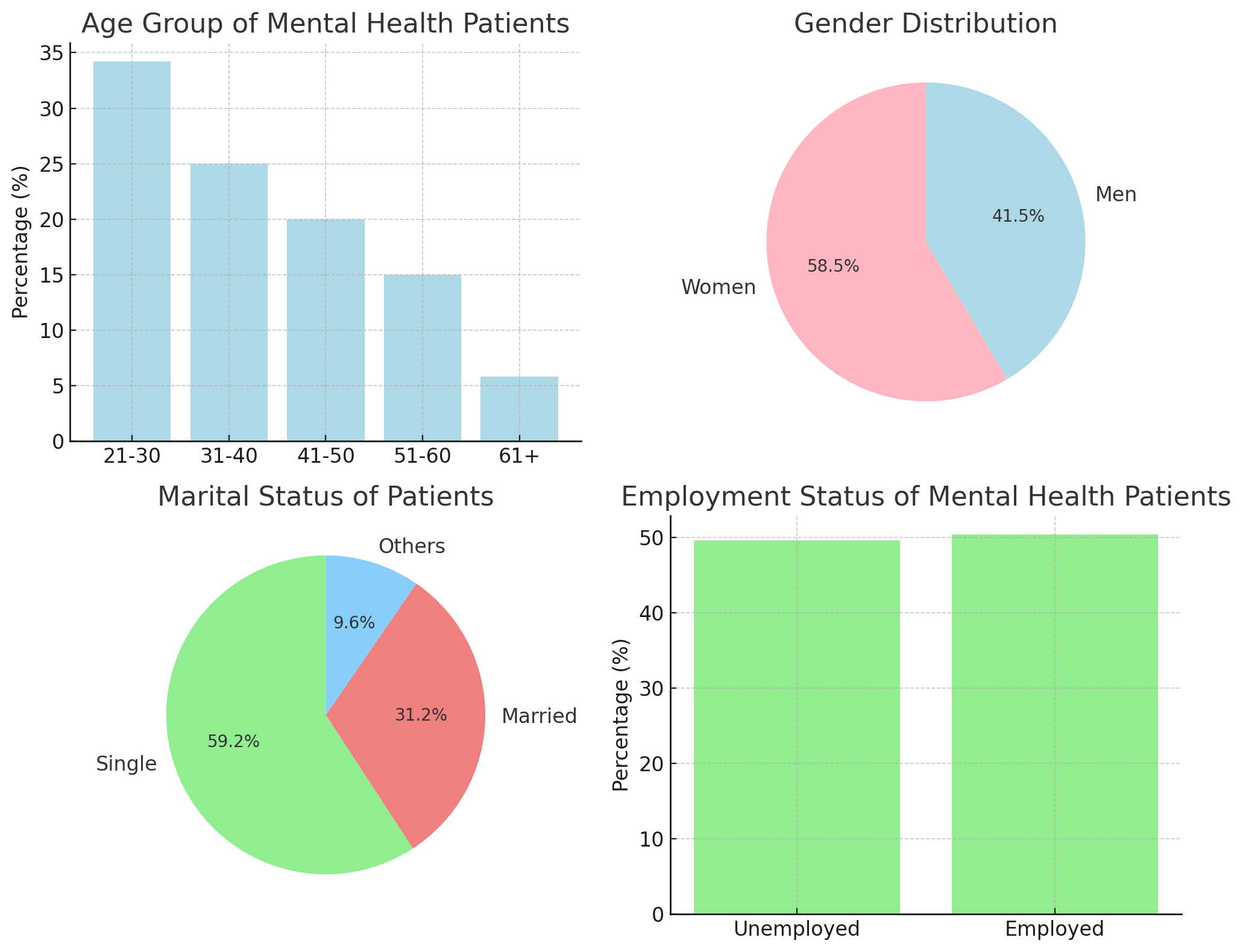
Mental health remains a critical public health issue in the Philippines, with conditions such as depression, schizophrenia, and anxiety affecting a large portion of the population. Despite the growing awareness, access to mental health care is still limited, particularly for those in rural areas. Data from the Philippine Mental Health Association (PMHA) offers valuable insights into the mental health landscape and highlights the challenges Filipinos face when seeking psychiatric care.
This blog post delves into the findings of the PMHA study on psychiatric outpatients, providing a comprehensive overview of the common diagnoses, demographic trends, and the importance of early intervention. For those seeking support, consulting with a psychiatrist in the Philippines or an online psychiatrist in the Philippines could be a significant step toward managing mental health.
Common Mental Health Diagnoses Among Filipinos
The PMHA study, which uses the DSM-5 as a diagnostic tool, provides a snapshot of the most prevalent mental health conditions among psychiatric outpatients in the Philippines:
- Major Depressive Disorder: Depression was the most common diagnosis, affecting 33.5% of the patients. Symptoms often include persistent sadness, loss of interest in activities, and difficulty functioning in daily life. Depression is also one of the leading causes of disability globally.
- Schizophrenia: Accounting for 24.5% of the cases, schizophrenia is a severe mental disorder characterized by hallucinations, delusions, and disorganized thinking. This condition requires long-term management, often involving medication and support from psychiatrists in the Philippines.
- Bipolar Disorder: Representing 15% of the patients, bipolar disorder involves extreme mood swings, from manic highs to depressive lows. Treatment for this condition usually involves mood stabilizers and psychotherapy, emphasizing the importance of early diagnosis.
- Anxiety Disorders: Anxiety disorders, including generalized anxiety disorder (GAD) and panic disorder, made up 8.9% of the cases. These disorders often cause excessive worry and physical symptoms like rapid heart rate, making everyday tasks challenging. Many patients benefit from therapy and medication to manage their symptoms.
These findings, derived from a study published in the ASEAN Journal of Psychiatry, underscore the prevalence of mental health conditions and the need for accessible psychiatric care in the country.
Demographic Trends in Mental Health
The PMHA study* provides detailed demographic information, shedding light on the populations most affected by mental health disorders in the Philippines.
- Age: Young adults, particularly those aged 21-30, comprised the largest group of outpatients (34.2%). This is significant as mental health disorders often first manifest during young adulthood. The pressures of early adulthood, including career and relationship challenges, may contribute to this trend.
- Gender: Women made up 58.5% of the patients, compared to 41.5% of men. While this could indicate a higher prevalence of certain mental health disorders among women, it may also reflect that women are more likely to seek help from a psychiatrist or psychologist in the Philippines.
- Marital Status: Most psychiatric outpatients were single (59.2%), suggesting that mental health challenges may be more prevalent or more likely to be addressed among single individuals. However, married individuals also faced significant mental health challenges, making up 31.2% of the patients.
- Employment Status: A striking 49.6% of the patients were unemployed, which correlates with increased rates of mental health disorders. Unemployment often leads to stress, financial difficulties, and a diminished sense of purpose, all of which can exacerbate mental health issues.
Understanding these demographic factors is essential for tailoring mental health services to meet the needs of specific populations.

Barriers to Accessing Mental Health Care
Despite the growing need for mental health services, many Filipinos face barriers that prevent them from receiving timely care. The PMHA study highlights several challenges:
- Stigma: Mental health stigma remains a significant obstacle. Many Filipinos fear that seeking help from a psychiatrist or psychologist will lead to judgment from family, friends, or society. In the Philippines, mental illness is often viewed as a personal weakness or a “family problem,” which further discourages people from seeking care.
- Limited Access to Services: The Philippines has a shortage of mental health professionals, particularly in rural areas. With fewer than 600 psychiatrists serving over 100 million people, accessing care can be difficult, especially for those living outside urban centers. For individuals unable to visit a clinic in person, online psychiatrists and online psychologists are becoming an important alternative for receiving care.
- Cost of Treatment: The financial burden of psychiatric care is another major barrier. While public services are available, they are often underfunded and overcrowded. Private mental health services, such as therapy and medication, can be costly, making it difficult for many Filipinos to receive regular treatment.
Addressing these barriers is crucial for improving access to mental health care in the Philippines. Expanding the availability of online psychiatric consultations could help bridge the gap, particularly for those in underserved areas.
The Importance of Early Intervention
Early intervention is critical in managing mental health disorders. The PMHA study highlights that many patients seek care only after their symptoms have become severe, which makes treatment more complex and recovery more difficult. Conditions like depression and anxiety are far more manageable when diagnosed early, allowing individuals to benefit from a combination of therapy and medication before their symptoms worsen.
Cognitive-behavioral therapy (CBT) and medication, for example, have proven highly effective in treating anxiety and depression, particularly when initiated at the onset of symptoms. For more severe conditions like schizophrenia and bipolar disorder, early diagnosis and medication management are key to preventing relapses and improving long-term outcomes.
Patients seeking help at iPsych Mental Health Clinic can access a range of services, including psychiatric evaluations, therapy, and medication management. Whether through in-person consultations or online sessions with a psychiatrist or psychologist, early intervention remains one of the most effective ways to improve mental health outcomes.
Moving Forward: Improving Mental Health Services in the Philippines
The findings from the PMHA study, as outlined in the ASEAN Journal of Psychiatry, emphasize the urgent need for improved access to mental health care in the Philippines. To address the growing demand, several measures are needed:
- Increase Access to Care: Expanding the availability of online psychiatrists and online psychologists can help reach Filipinos who cannot access in-person services. Telehealth has proven effective in increasing access to care in other parts of the world, and the Philippines stands to benefit from adopting similar models.
- Reduce Stigma: Public education campaigns are essential for breaking down the stigma surrounding mental health. By normalizing conversations about mental illness, more individuals will feel empowered to seek help from professionals like those at iPsych mental health clinic.
- Affordability: Ensuring that mental health services are affordable is critical. This could involve increasing government funding for public mental health programs, expanding insurance coverage, and providing more accessible mental health services to low-income families.
- Encourage Early Diagnosis: Educating the public on the importance of early diagnosis can lead to better outcomes. When people recognize the signs of mental health disorders early, they are more likely to seek treatment before the condition worsens.
By addressing these challenges, mental health services in the Philippines can become more inclusive and accessible to everyone.

Depression in the Philippines: Recognizing the Signs and Seeking Help Early
Depression is one of the most prevalent mental health issues in the Philippines, affecting millions of individuals across various age groups. Despite this, depression remains misunderstood and underdiagnosed due to the stigma surrounding mental health. Many Filipinos hesitate to seek help, believing they can overcome these feelings independently, or they fear judgment from others. However, depression is more than just sadness or a fleeting mood—it is a serious mental health disorder that impacts how you think, feel, and function in daily life.
Understanding Depression
Depression can manifest in a variety of ways. Common symptoms include persistent sadness, hopelessness, a loss of interest in activities once enjoyed, and changes in sleep or appetite. Physical symptoms, such as headaches, fatigue, or digestive problems, often accompany emotional distress. Depression affects individuals differently, which is why it is important to recognize that these symptoms may not always be obvious.
In the Philippines, depression can often be overlooked because people tend to downplay their emotions, attributing their struggles to stress, fatigue, or life’s challenges. However, depression is not simply something one can “snap out of.” It requires proper care, and the sooner one seeks help, the better the chances for effective treatment and recovery.
Recognizing the Early Signs
Recognizing the signs of depression early can prevent the condition from worsening. People experiencing depression may:
- Feel persistently sad, empty, or anxious
- Withdraw from social interactions or lose interest in activities
- Have trouble concentrating or making decisions
- Experience changes in sleeping or eating habits
- Have thoughts of self-harm or suicide
If these symptoms persist for more than two weeks, it’s time to consult a mental health professional.
Seeking Help Early
Early intervention is crucial for managing depression. The earlier the symptoms are identified, the better the chances for successful treatment.
In the Philippines, people can access support by consulting a psychiatrist or psychologist, either in person or through online services.
Seeking professional help does not mean weakness—it signifies taking control of one’s mental health. Therapy, such as Cognitive Behavioral Therapy (CBT), has proven effective in treating depression, and helping individuals reframe negative thinking patterns. In some cases, medication prescribed by a psychiatrist in the Philippines may be necessary to manage more severe symptoms.
For those who cannot physically visit a clinic, online psychiatric services provide a convenient and accessible way to get help. This is especially helpful in rural areas where mental health services may be limited. An online psychiatrist can conduct assessments, prescribe medication, and offer guidance remotely, allowing patients to receive care from the comfort of their homes.
The Importance of Family and Social Support
In Filipino culture, family plays a vital role in mental health care. Encouraging family members to talk openly about mental health can reduce stigma and support those dealing with depression. When family members understand that depression is a medical condition requiring treatment, they can help guide their loved ones toward seeking professional care.
Support groups and community-based programs can also provide a sense of belonging and understanding for individuals with depression. These networks allow individuals to share their experiences, lessen feelings of isolation, and develop coping strategies.
Depression is a widespread yet treatable mental health condition. By recognizing the signs early and seeking professional help, individuals can regain control over their lives and start the path to recovery. Whether through in-person consultations or online mental health services, help is available.
If you or someone you know is struggling with depression, don’t wait.
Let’s connect
Contact iPsych through the channels below.
Address: 1801 Centuria Medical Makati Century City Gen. Luna St, cor Salamanca, St. Brgy, Poblacion Makati, Metro Manila

Designed by Design Manila | Privacy Policy | Patient Agreement | Site Map



